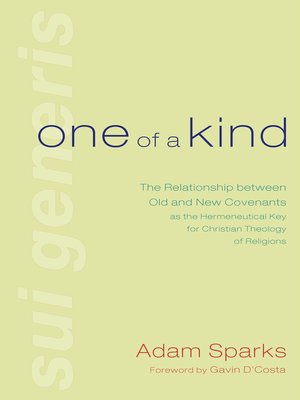One of a Kind
ebook ∣ The Relationship between Old and New Covenants as the Hermeneutical Key for Christian Theology of Religions
By Adam Sparks

Sign up to save your library
With an OverDrive account, you can save your favorite libraries for at-a-glance information about availability. Find out more about OverDrive accounts.
Find this title in Libby, the library reading app by OverDrive.



Search for a digital library with this title
Title found at these libraries:
| Library Name | Distance |
|---|---|
| Loading... |
A fundamental requirement in an inclusivist understanding of the relationship between Christianity and other religions is evidence of God's salvific activity outside any knowledge of Christ. This is commonly identified in the religion of Old Testament Israel. On this basis an analogy (the "Israel analogy") is drawn between the religion of the old covenant and contemporary non-Christian religions. Closely related is the parallel argument that as Christ has fulfilled the Old covenant, he can also be seen as the fulfillment of other religious traditions and their scriptures. This study outlines the use of the Israel analogy and the fulfillment model, subjecting these concepts to a biblical and theological critique revealing that the exegetical and patristic data are misconstrued in support of these concepts. Furthermore, the Israel analogy and the fulfillment model undermine the sui generis relationship between the old and new covenants and fail to respect the organic, progressive nature of salvation history. They also misconstrue the old covenant and the nature of its fulfillment in the new covenant. The Israel analogy and fulfillment model rely on a correspondence between the chronologically premessianic (Israel) and the epistemologically premessianic (other religions), and therefore consider the "BC condition" to continue today. In so doing, they undermine the significance of the Christ-event by failing to appreciate the decisive effect of this event on history and the nature of existence. It marks a radical turn in salvation history, a crisis point, rendering the BC period complete and fulfilled. Therefore the concept of a continuing "premessianic" condition or state is seriously flawed, as are the Israel analogy and fulfillment model. Thus the inclusivist paradigm reliant in large part on these defective concepts is also problematic, and proponents of this paradigm need to reconsider its basis.







